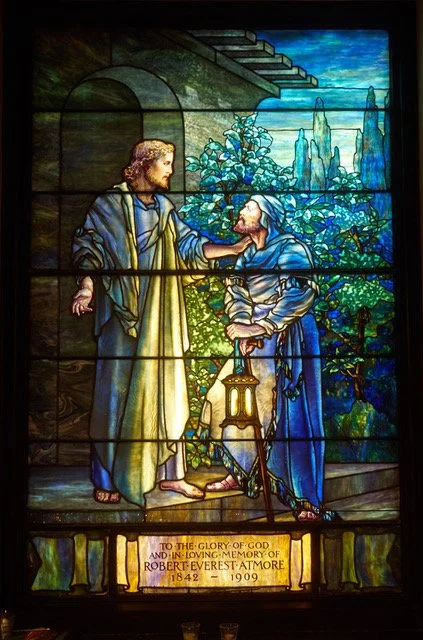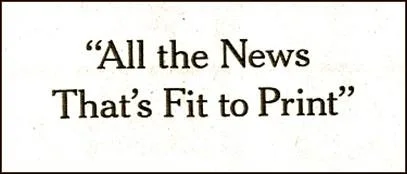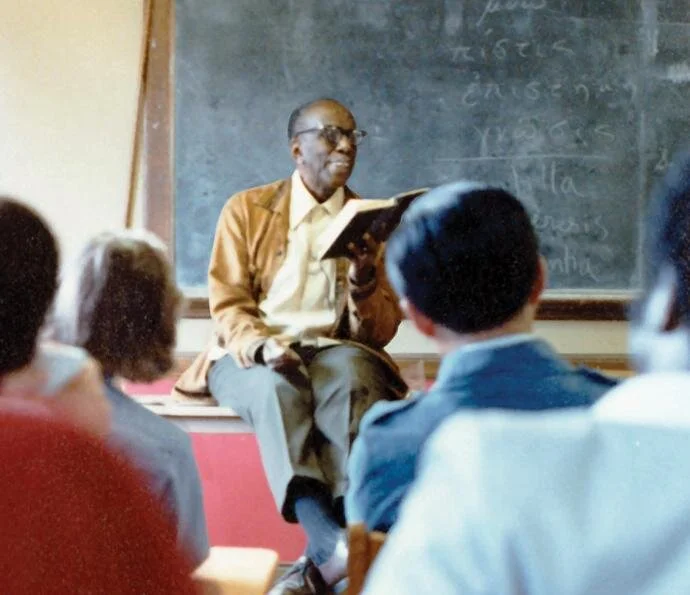Friday Reflection: On James the Apostle and the Letter of James
…Rid yourselves of all sordidness and rank growth of wickedness, and welcome with meekness the implanted word that has the power to save your souls…[And] be doers of the word, and not merely hearers who deceive themselves. For if any are hearers of the word and not doers, they are like those who look at themselves in a mirror; for they look at themselves and, on going away, immediately forget what they were like. But those who look into the perfect law, the law of liberty, and persevere, being not hearers who forget but doers who act—they will be blessed in their doing.
—James 1: 21-25
I. My topic for the Friday Reflection this week is “James the Apostle and the Letter of James.” The church celebrates James the Apostle on Saturday, July 25. A great topic, I thought. And it is, but I discovered there are a number of complications, the first of which is that James the Apostle, called “James the Great,” did not write the Letter of James! The second complication is that there is another James the Apostle called “James the Less,” who, with the apostle Philip, the church celebrates on May 1. This other James did not write the Letter of James either.
II. The third complication turned into a wonderful opportunity. I discovered yet a third James, “James the Just,” --“Not another one.” I thought! James the Just is now considered by most scripture scholars to be the author of The Letter of James. It gets better: James the Just was the brother of Jesus, to whom Jesus appeared after his Resurrection. Eventually, James became a prominent figure in the early Church. Once the church in Jerusalem was established, James the Just was the presiding leader and one of the “three pillars” of the church in Jerusalem who, along with Peter and John, served Jewish and Jewish Christian members, using Torah observance of the law as a foundation for the emerging Christian community. James also worked extensively with Paul.
III. Early on, there was a great deal of disagreement about the author of “The Letter to James;” indeed, at one time, both James the Great and James the Less were given serious consideration as candidates for authorship. However, the renowned New Testament scholar, Raymond Brown, argues that James the Just is the “only truly plausible candidate; James listed first among the “brothers” of Jesus in Mark 6:3; Matthew 13:55, not a member of the Twelve but an apostle in a broader sense of the term (! Cor 15:7; Gal 1:19).” For Brown, the most significant element in the argument that “James the Just” is the author comes with the conviction that “the imagery… of James [the Just] is as a conservative Jewish Christian very loyal to observing the Law.” Brown was studied enough to know of the important connection between Torah observance and the Letter of James, that for both, the “law” was central.
(cf. Raymond E. Brown, Introduction to the New Testament, pp. 725-727, ff).
IV. Raymond Brown further argues that The Letter of James “has come into its own in our time as the most socially conscious writing in the New Testament.” (cf. Brown, p. 725) The Letter of James is part of the canon of wisdom literature--a formal teaching document with a significant moral imperative, what could be called the “law” of everyday living. In this sense, it is useful to see the “Letter” of James as an “Epistle,” a literary genre meant to be read as a document that has clear implications for both personal and communal behavior. As a very structured “epistle,” James’ letter is in the tradition of Torah with its observance of the “Law,” and can be seen as a kind of “rule” for everyday living, with specific behavioral demands.
V. Once thought not to be well organized, scripture scholars now agree that the “Letter of James” does have a recognizable structure through the organization of the sections in the letter. There is, however, no firm agreement on the number of sections nor on how the sections are identified. Here, we can offer what are generally agreed to be the main sections of the letter, not including the salutation and the closing: Faith & Wisdom; Poverty and Riches; Trial and Temptation; Hearing and Doing the Word; Warning against Partiality toward the rich; Faith and Works; The Tongue; The Wisdom from Above; Friendship with the World; Judging a Brother; Warning again Boasting; Warning to the Rich; and Patience and Prayer. All of these powerful topics in six pages of text! [depending on the size of your Bible’s print].
VI. As sometimes struggling Christians, our tendency is often to read past the Letter of James because it strikes us as a bit old-fashioned…as in, “whoever ever pays attention to this stuff anymore”? The challenge of the Letter of James is, first of all, that we read it; that we read it carefully and openly, as Benedict would tell us, “with the ear of our heart,” and see it and hear it and take in as much of the text as we can. Finally., after centuries of disagreement, the Letter of James came to be seen as the “most socially conscious writing in the News Testament” (cf. Raymond Brown), instead of Martin Luther’s view of it as a “right strawy epistle,” having very little to do with the New Testament [e.g.there is an instructive correlation between James and the beatitudes of Matthew]. The challenge of the Letter of James, in this endless time of the Corona virus and its more than 4 million cases and the rapidly unfolding obscenity of America’s president and his party, is to see how extraordinary and modern the letter really is.
VII. The Letter of James the Just is truly a compendium of the laws of everyday life, a life informed by the “implanted word” (1:21), and an acknowledgment of the combat between ourselves and everyone else, between the personal and the communal. Given these recent years, we may think we know how NOT to behave. Still, every day we need to be reminded of how to behave justly and to put others first.** How about wearing a mask on behalf of everyone else and as a reminder for ourselves to be “doers who act.”(James 1:25) When we think about this in the context of the Letter of James, it suddenly makes a lot of sense, doesn’t it?
Gracious God, we remember before you today your “first among your brothers,” James, who was not a member of the Twelve but an apostle in a broader sense; James the Just, who served the emerging Christian communities of Jerusalem and Antioch and who taught us in his letter that faith apart from works is dead. As we go forward, give us the grace and courage to make the “implanted word” of the Letter of James our own; through Jesus Christ our Lord and your brother, James the Just.
Amen
** cf. James 2:8-10; 14-26
James 3: 13-18
James 4: 7-12
James 5: 12-24









